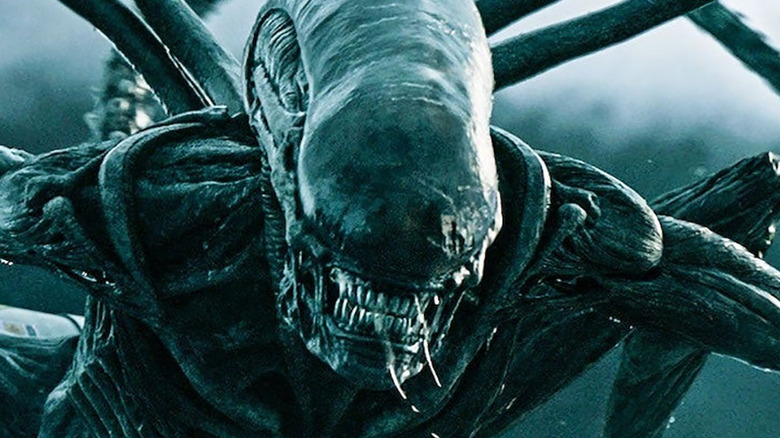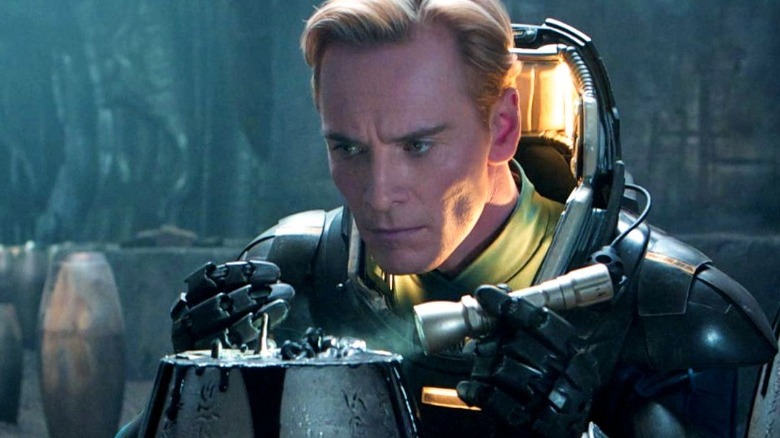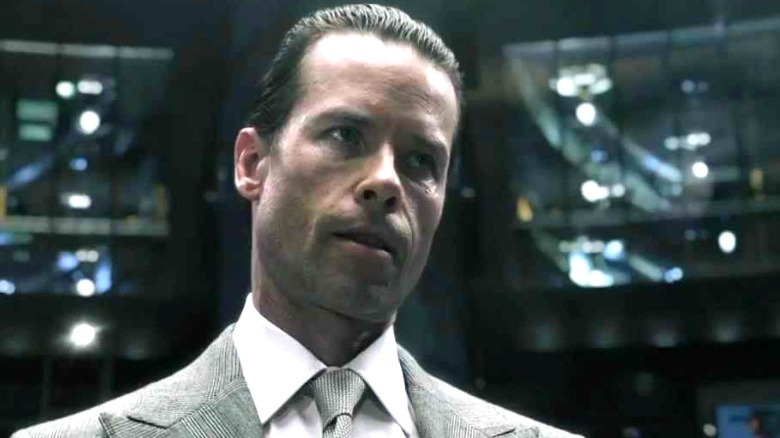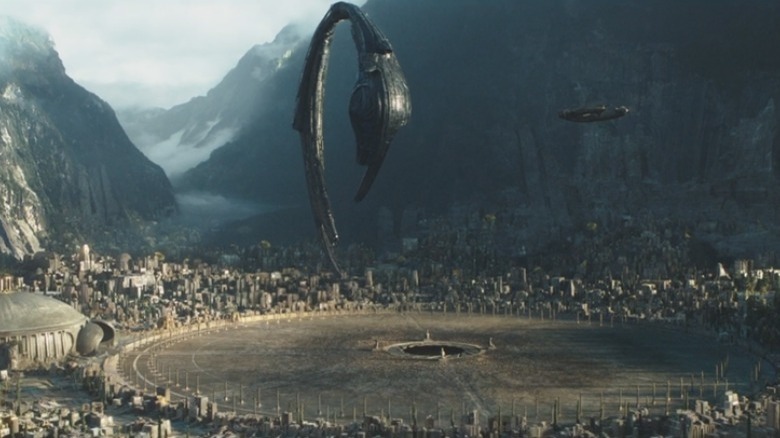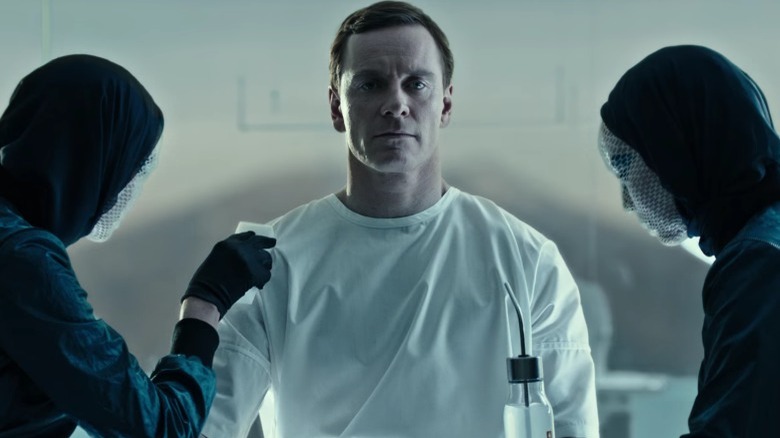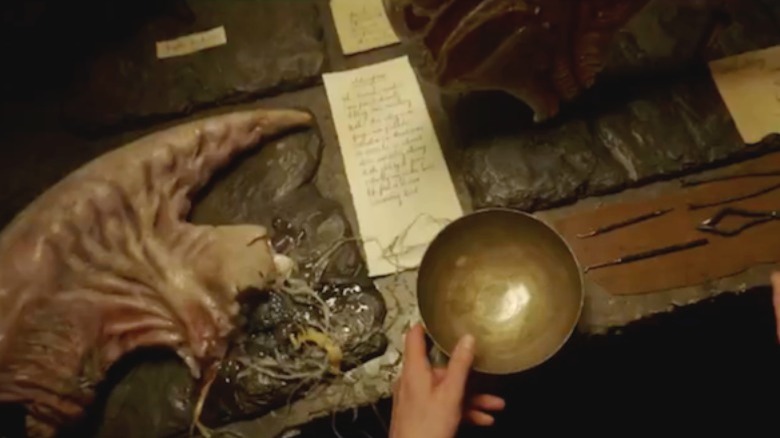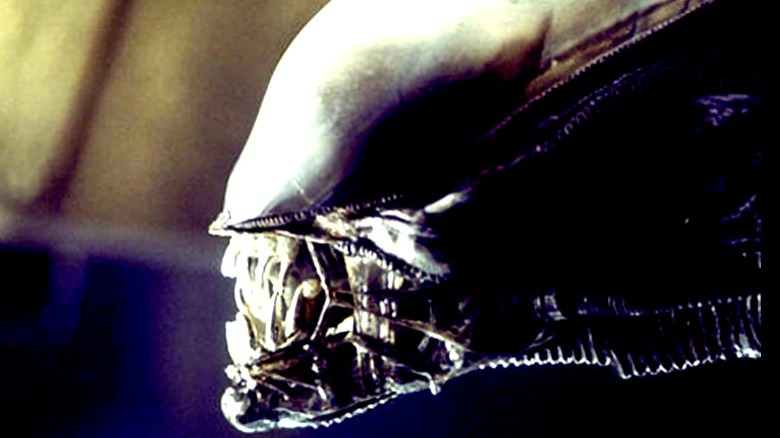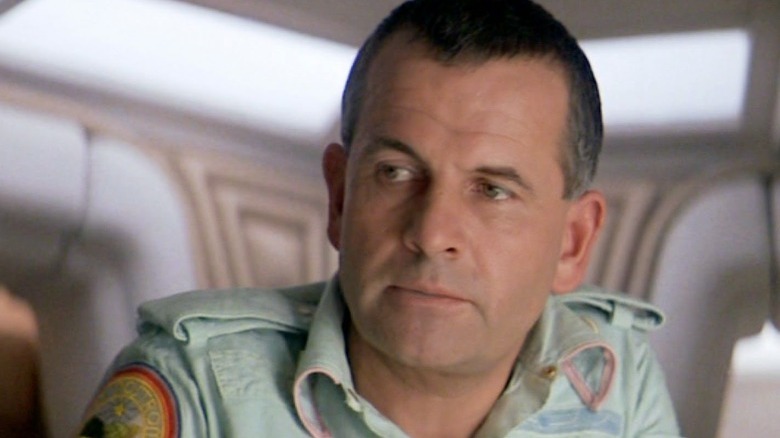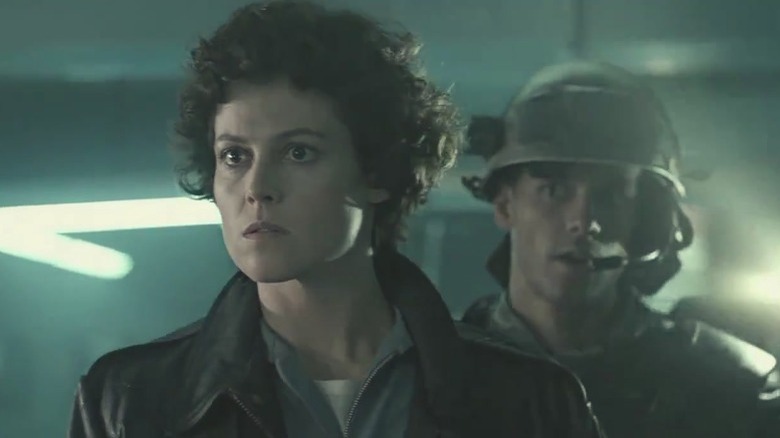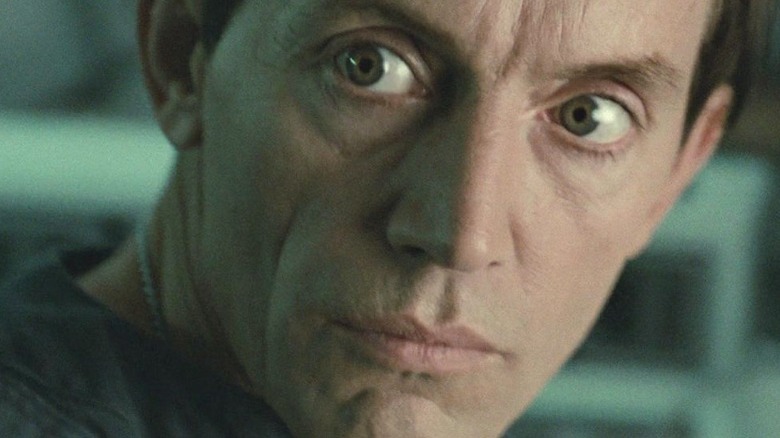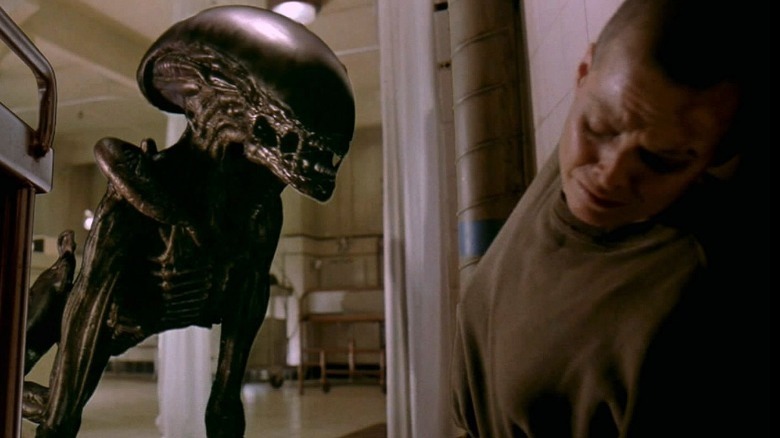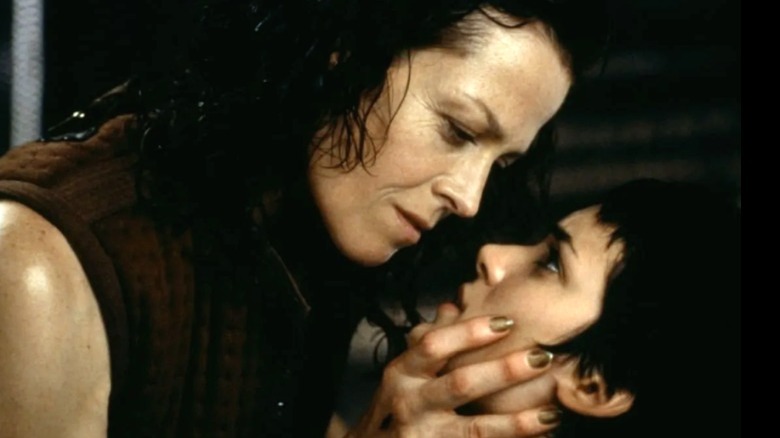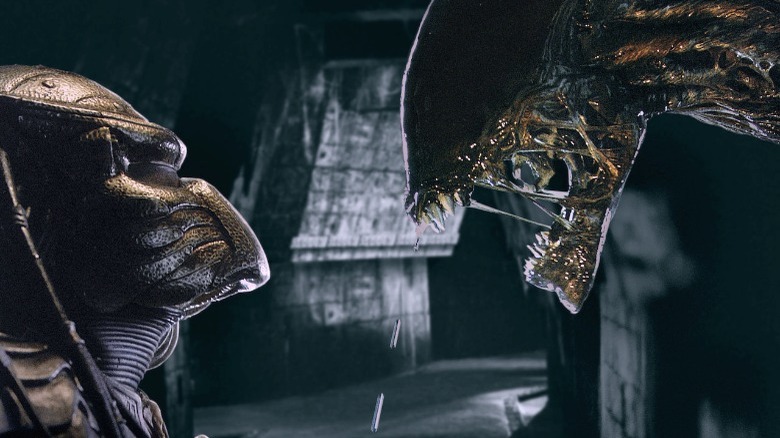How To Watch The Alien Movies In Order
Ridley Scott's Xenomorph started its hunt with "Alien" in 1979, and though there have been some pauses between installments, we inevitably return to its bleak, Geiger-designed future again and again. With a new Alien series exploring amoral mega-corporation Weyland-Yutani on the way, it's worth studying how we got here.
The timeline of the Alien franchise can be hard to follow, as Ridley Scott delved into the creation of the Xenomorphs decades after making the first movie. However, there are a few themes that tie most of the films together. Though the mystery of the Xenomorphs is the acid-drenched soul of the franchise, the movies also tackle the nature of free will through its android characters, and decry the militaristic greed that fuels companies like Weyland-Yutani. When watching the films in order, these themes, with some exceptions, help fans understand where they are in the series' long and complex history.
Determining what is and isn't canon in the broader Alien franchise can be tricky. However, franchise consultant Andrew E.C. Gaska created a terrific resource in his essay, "Defining Canon in an Alien World." Building off of that, here's what you need to know if you're planning to watch the Alien series in order.
Prometheus
Released in 2012, "Prometheus" was Ridley Scott's long-awaited return to the world of "Alien." The Christmas setting is deliberate, as the film opens with religious symbolism mixed with a glimpse of aliens once nicknamed the Space Jockeys. Now Engineers, these marble-skinned humanoids create life on distant planets using their own DNA. In the original "Prometheus" script, one Engineer was even crucified for heresy on Earth roughly two thousand years ago.
It's not subtle stuff, but it creates some interesting, heavily contextual world-building, and it legitimizes the religious horror of the reviled "Alien 3." "Prometheus" also gives some long-time Xenomorph fans their due, confirming that the iconic monsters were genetically designed as weapons.
Michael Fassbender's eerie android David 8 becomes the bedrock for the role of synthetics in the Alien universe. Too perfect and intrusive, his presence feels like an anachronism. But David's uncanny valley beauty makes sense; he's proof of concept for Weyland's future products. That David is given too much individuality and goes off the rails is part of the series' larger discussion about free will. This is the only canon film streaming on HBO Max.
The Prometheus promotional shorts
Ridley Scott oversaw production of three short films set before "Prometheus." The most intriguing is "TED Conference, 2023," a recording of young Peter Weyland. Seeing Guy Pearce without his bulky "Prometheus" make-up sheds new light on the character, and Weyland's speech offers clues about how much of Peter is inside David, making David's crawl towards freedom — and away from the sins of his father — seem more logical.
"Quiet Eye" is less interesting. It introduces Dr. Elizabeth Shaw via a pre-recorded message to Weyland, in which she asks for help with a research mission. It reuses Noomi Rapace's audition footage with minor touch-ups, and it adds some humanity to her plea to study our interstellar origins. But it's negligible viewing; her introduction in "Prometheus" works better.
The final film is the best. "Happy Birthday, David" is like an Apple product video filmed on weed. It attempts to highlight how human and fun Weyland's new line of androids can be, although it starts off with a newborn David coming off the assembly line to keep us from being too comfortable. Ridley Scott enjoys teasing connections between Weyland's androids and the world of "Blade Runner," and it's easy to picture this advertisement coming from the equally inhumane Tyrell Corporation. All short films are available on YouTube and the home releases of "Prometheus."
The Alien: Covenant shorts
It's bad art to hide information in external media, yet the shorts that premiered before "Alien: Covenant" are guilty of exactly that. "Crew Messages" is "Quiet Eye" but worse, providing character introductions for a movie that didn't bother to make anyone memorable. Inexplicably, one installment is an ad for an Audi lunar rover. "Phobos," which sees the crew of the Covenant undergoing mental examinations, is psychological torture. "She Won't Go Quietly" is non-canon. "Meet Walter" is meant to parallel "Happy Birthday, David," and isn't up to the same level.
Two are crucial, which is frustrating. "The Last Supper" returns to more of the heavy-handed symbolism of "Prometheus," showcasing the colonists while giving James Franco something to do. Franco goes to bed early with a fever, which is foreshadowing 101, while the rest of the crew throw a last-minute party that echoes the last meal scene in "Alien."
"The Crossing" is maddening, laying the groundwork for Dr. Elizabeth Shaw's ultimate fate and showing the first moments of the genocide David releases on the Engineer's world. It's a big source of frustration for fans who wanted to explore the mysteries of creation, but Ridley's new obsession is with David's patriarchal madness. The fact that the entire short isn't part of the movie is bizarre. All of these short films are included on the "Alien: Covenant" DVD and Blu-ray, and most are available on YouTube.
Alien: Covenant
"Alien: Covenant" ties off some loose ends that "Prometheus" left behind, but does it via amputation. The Engineers are annihilated before the movie even starts, and this movie makes it clear that what Ridley Scott found fascinating was never the aliens, but the themes surrounding them. Unfortunately, while "Prometheus" has some strong moments, "Covenant" rarely sticks the landing. David's erratic motivations defy explanation, so the film doesn't even try.
The film goes through the motions, echoing what made "Alien" feel special without adding anything new. Not that the cast is at fault. Danny McBride shines as Tennessee, a caustic fellow with heart, and Michael Fassbender nicely differentiates Walter from David. Free from Weyland's emotional abuse, Walter becomes a humane but tragic ambassador for fellow androids Bishop and Call. Unfortunately, he's disposable.
The worst parts of "Covenant" are the changes to the Xenomorphs. Fandom has done its best to explain why David's facehuggers implant their eggs so quickly, pointing out that they're variations on the original Xenomorph template. It makes sense, but without in-universe clarification, the new Xenomorphs confused fans. Worse, "Alien: Covenant" ends on a cliffhanger that's not likely to be resolved. This film is streaming for a fee on Apple and Amazon.
The gap between Covenant and Alien
"Alien" takes place in 2122, 17 years after "Alien: Covenant." But, despite that short amount of time, a lot happens in between. "Covenant" continued putting vital information in spin-off media. Peter Weyland's corporation became Weyland-Yutani not on screen, but in a book by Alan Dean Foster. "Origins," published months after the film debut, describes how Yutani's CEO raided Weyland Corp after Peter's death, explaining why the colonists were flying under a familiar corporate banner.
There were also two more "Alien: Covenant" short films produced after the movie's release. One, "Advent," was included on the DVD. It's David's thesis on how to create a superior being, mailed to Weyland-Yutani. In grotesque autopsy sequences, David defiles Dr. Shaw as he talks about perfecting his creation. "Advent" also makes it clear that Daniels, one of the Covenant's two surviving colonists, is fated to become part of the first Xenomorph Queen. It's an act that will ensure the future replication of the species.
The other film, "David's Lab — Last Signs of Life," was released on YouTube as an anniversary gift. Twelve minutes long, it's too slow for what it offers. Weyland-Yutani has sent an expedition to study David's lab, and, of course, one of David's new facehuggers takes a bite out of the new arrivals.
Alien
Almost everything important has been said. Ridley Scott's "Alien" is the foundational work of space horror. It's a transgressive statement about masculinity. There are loads of great takes to read about this classic. But at its core, "Alien" is a mashup of haunted house stories and workplace malevolence. Take the crew off their spaceship and give them a fleet of Peterbilt trucks, and it'd be the same story. Blue collar workers must go out of their lane for a special pickup or they'll get no paycheck. One ride-along is a corporate stooge. All of them are disposable.
It's that grimy reality that makes "Alien" ageless. The giant monitors and crappy readouts make sense to anyone who has been on a factory floor. They're towering monuments to the accounting department's insistence that, if the machines still function, there's no reason to upgrade them.
Weyland-Yutani doesn't give a rip about Captain Dallas, Ripley, or even the android they slipped on board. Ash probably cost more than the old workhorse tanker itself, and he has only one directive that doesn't promise his safe return. But the promise of alien tech is too alluring for the corporation, and the prequels make it clear that Weyland-Yutani knows what they're buying with these human lives. "Alien" can be streamed for a fee on Apple and Amazon.
All about Ash
Ash, the Nostromo's secret android, is key to understanding one of the Alien franchise's biggest themes. Ash creates part of a psychological trio, which comprises a less structured version of the human ego. On one side, Ash is the embodiment of corporate desire, analytical and unable to empathize. On the other, there's the crew, motivated by the human drive to survive. Standing between these two halves is the amoral, impulse-driven Xenomorph, a creature that Ash calls the perfect organism, and the weapon the Nostromo's crew is to be sacrificed to acquire.
David is Ash's intellectual progenitor, as he is almost to all the franchise's androids, but Ash's ability to evolve has been removed. Ash exists to serve, and he's content with that. He only becomes erratic when he's forced to improvise. The implication is that androids like David were too unpredictable, so Weyland-Yutani stopped making them. By the time the Nostromo is sent out on its mission, Weyland-Yutani's android development is farmed out to Hyperdyne, a subsidiary (probably) meant to smooth over any PR issues the David products caused. The results are the same; these androids are loyal servants to corporate greed. Only the product labels are different.
Aliens
"Aliens" became a worthy follow-up to the original by understanding the theme of "Alien," then building something else. Subverting the expectations of most action flicks, James Cameron tears open the military-industrial complex by confronting it with an unwinnable war. "Aliens" feels like a standard military film right up until the Colonial Marines get torn apart by the Xenomorphs. Part of their problem is that information has been withheld by corporate interests (in "Aliens," Carter Burke represents Weyland-Yutani), a reading that's been heightened by the prequels.
The on-screen war is between the Marines and the Xenomorphs, but behind them a bigger battle stays under the radar until Ripley calls it out. The loss of the colony on LV-426 is a big hit to Weyland-Yutani's finances, who never should've let a settlement be built there in the first place. But Burke's discovery that there's a valuable bioweapon to be recovered in the wreckage renders both the colonists and the Marines just as disposable as Ripley's original crew.
There's no end to corporate greed. It's the heart of the "Alien" franchise, and James Cameron brings it to the foreground. To paraphrase Ellen Ripley, for all the dangers the Xenomorphs hold, they don't tear each other apart for a percentage of the profits. "Aliens" is currently streaming for a fee on Amazon and Apple.
All about Bishop
James Cameron also subverted the themes of "Alien" in one other way. Lance Henriksen as the android Bishop is set up to upset both Ripley and the audience. But by not making Bishop's identity a secret, "Aliens" gives the audience a chance to see him as an actual character. It's rational to fear him, especially during his autopsy of a facehugger, but to the Colonial Marines, he's just one of the guys.
Henriksen gives Bishop an awkward sensitivity that eases the fact that he's an android, and it becomes clear that, while he's as intelligent as Ash was, his loyalty is to his crew, not to Weyland-Yutani. He's there to help people come back alive. In order to do that, his programming gives him a reason to care.
The prequels revealed that androids can assume the flaws of their makers. "Alien" showed that, without a heart, an android will execute its commands without hesitation. But Bishop is allowed to be almost human, making what happens to him in the finale all the more devastating. However, his legacy remains. Bishop's choices proved that there's a better future for his synthetic people, if their creators have benevolent motives. In the Alien universe, Bishop represents the future of AI.
Alien 3
David Fincher's big Hollywood debut isn't a career highlight, but 1992's "Alien 3" isn't entirely his fault. For one, the movie's rotoscoped effects makes the film's quadruped Xenomorph look like a Shrinky-Dink. But the heart of a religious horror movie beats inside this mess, and casting the Xenomorph as an unholy dragon sent to reap judgment on a prison full of sinners, with Ripley herself serving as both Magdalene and Mary, is an interesting take.
The diaspora of the prisoner colonies implies that Weyland-Yutani isn't doing so hot back home, despite the fact that the movie is set during same year as "Aliens." The "Alien 3" finale reinforces that idea by having corporate advocates show up with a skeleton crew, able to accomplish little more than a play for Ripley's emotions by dragging along the designer of the Bishop android line.
The film barely works, although it still hurts to see Ripley throw herself into boiling metal, eternally joined in death with the alien that's haunted most of her life. It's a finale of sorts for Ellen Ripley, but it wouldn't be the end for the Xenomorphs, or for the androids that stood by and watched their development over centuries. "Alien 3" is currently streaming for a fee on both Amazon and Apple.
Alien: Resurrection
"Alien: Resurrection" takes a 200-year leap into the future and dismisses the threat of Weyland-Yutani with a joke about them being bought out by Wal-Mart. It's a low-key ending for the corporate monster, but there's harmony in the idea that there will always be a bigger, badder shark in the water.
And yet, the mega-corporation left all of its toys behind, and the United Systems Military still wants what Peter Weyland promised them centuries ago. The cloning storyline in "Alien: Resurrection" is garbage carried by good performances, with Ripley 8 becoming David's inhuman bookend. But while cloning has leached away some of Ripley's humanity, the androids get a short but fascinating plot about becoming more human than their makers. Call is an autonomous second-gen android who, like others of her line, have made fixing the malicious ethics of their makers into a cause.
In a better film, the androids' choice to become more like the humans that tried to stop Weyland and his successors would feel more important. Instead, it leaves the film with the same almost-was melancholy that Ripley and Call feel when they both glimpse Earth for the first time. Released in 1997, "Alien: Resurrection" remains the final chronological film in the franchise. "Alien: Resurrection" is streaming for a fee on Apple and Amazon.
Alien vs. Predator
2004's "Alien vs. Predator" and its sequel, "AVP: Requiem," are set before "Prometheus." Neither is canon, and that's for the best. The way to place these films in context is to understand that they're part of their own goofball world, where the rules are made up and the plots don't matter. "Alien vs. Predator" has a garbled notion of Alien history, happy to suggest that the Xenomorphs are training dummies for young Predators. Given the movie's premise, that's fine. Once humans get mixed up in the Predator training mission, there's not much need for a plot.
Lance Henriksen gives the movie his best, and Sanaa Lathan has some awkward but almost touching moments with a Predator. It's a fun watch, at least. Meanwhile, "AVP: Requiem" features a Predalien that's somehow the perfect opposite of how cool it should have looked. The plot feels even more nihilistic than "Alien 3," but without anything meaty to back it up.
When watching the "Alien" films in chronological order, it's best to save "Alien vs. Predator" as a treat for the end; it's out of place, but fun once we're already loopy. Both AVP flicks are available to stream on HBO Max, but from the bottom of our hearts, please, only bother with the first one.
